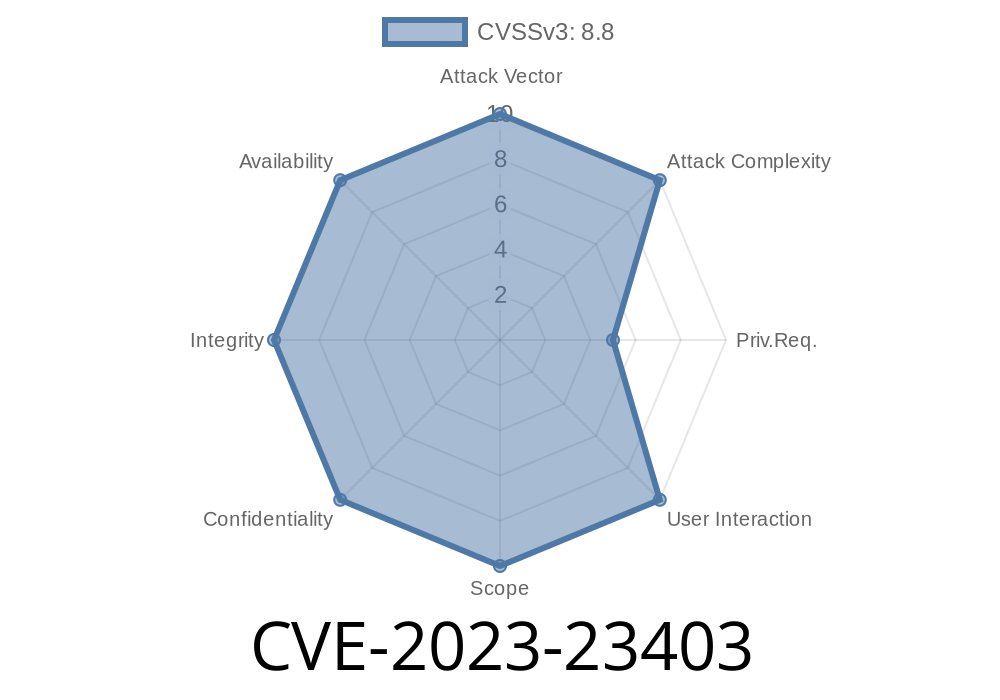In this post, we’ll take a deep dive into CVE-2023-23403, a serious vulnerability found in Microsoft’s PostScript and PCL6 class printer drivers. We’re going to break down what it is, why it’s dangerous, and how attackers can exploit it—all explained in simple terms. As a bonus, you’ll see example code and links to official resources.
What Is CVE-2023-23403?
CVE-2023-23403 is a Remote Code Execution (RCE) vulnerability in Microsoft Windows because of how printer drivers (PostScript and PCL6 classes) handle specially crafted files sent to a print server.
Simply put, an attacker can use this flaw to run their own code on your computer—just by sending a bad file to your printer over the network.
How Does the Vulnerability Work?
When Windows receives print jobs, the drivers process the files using the installed printer classes. If an attacker crafts a print job with special data, the driver might mishandle it—crashing, or even worse, letting the attacker run code as SYSTEM (the highest privilege).
This is often due to a buffer overflow or unsafe memory handling in the driver.
Exploit Scenario
An attacker first needs access to the print queue (networked or local). Then, they send a malicious document—say, via the Windows Print Spooler—that exploits this bug.
Good News
Microsoft patched this issue in their February 2023 Patch Tuesday release. But, if you haven’t updated your systems, you are still at risk.
Reference
- Microsoft Security Update Guide: CVE-2023-23403
- NVD Entry (NIST): CVE-2023-23403
The job includes a malicious PostScript or PCL6 file.
3. The vulnerable printer driver processes the job, but a specific routine fails to check the file properly.
Proof-of-Concept (PoC) Snippet
Below is a simple Python script that simulates sending a "crafted" print job to a print server—for educational purposes only.
*(Note: This is not a live exploit but a demonstration of the attack method.)*
import socket
# OPTIONAL: Replace with the IP and port of your print server
PRINTER_IP = '192.168.1.50'
PORT = 910 # Standard RAW printing port
# Malicious payload simulating a malformed PostScript job
malicious_job = b"%!PS-Adobe-3.\n" # PostScript magic header
malicious_job += b"%%%%Title: Exploit\n"
malicious_job += b"%%%%Creator: EvilScript\n"
malicious_job += b"/payload {( ) cvlit 10000000 string copy pop} def\n"
malicious_job += b"payload\nshowpage\n" # Overflows or confuses the parser
malicious_job += b"%%EOF\n"
# Send the job over the network
with socket.socket(socket.AF_INET, socket.SOCK_STREAM) as s:
s.connect((PRINTER_IP, PORT))
s.sendall(malicious_job)
print("Sent simulated malicious print job.")
In a real attack, the payload would be fine-tuned to exploit the exact buffer overflow or parsing bug.
Exploit Details On the Wild Web
Shortly after Microsoft reported this, security researchers published analyses. Public exploit code was withheld due to the severity, but some details can be found in:
- Zero Day Initiative: ZDI-23-184
- MSRC Blog Post
Final Thoughts
CVE-2023-23403 shows how something as innocent as a printer driver can open the door to hackers. Attackers are always looking for weak spots in old, trusted components like print drivers. Keeping Windows updated and minimizing network exposure for print services are your best defense.
Stay safe, keep your patches up to date, and always treat your printers with as much care as your servers!
References
- Microsoft CVE-2023-23403
- NIST NVD CVE-2023-23403
- Zero Day Initiative ZDI-23-184 Advisory
---
Timeline
Published on: 03/14/2023 17:15:00 UTC
Last modified on: 03/23/2023 16:54:00 UTC
